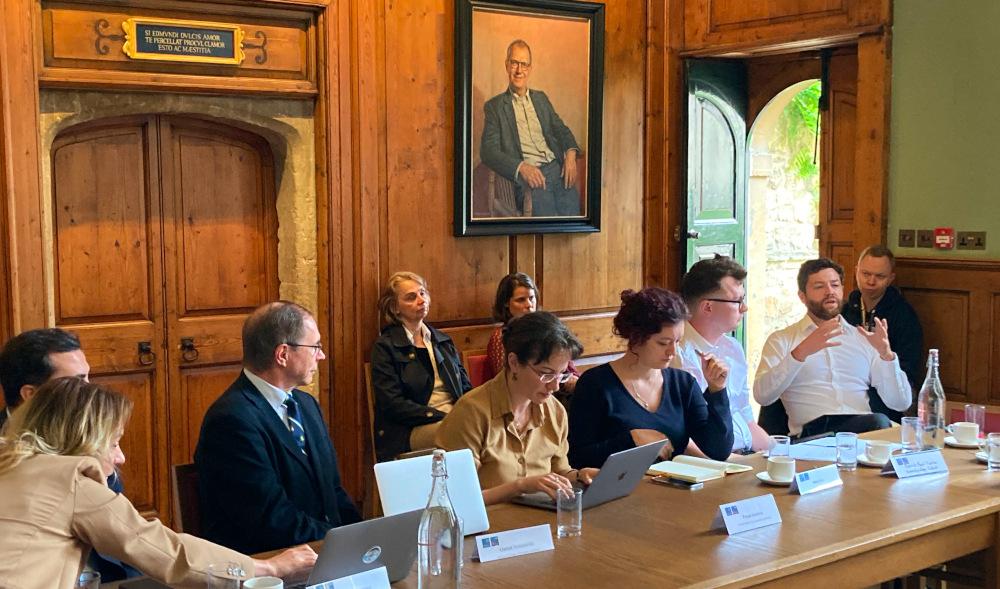Inclusive Recovery in Action - Strategies for a Resilient Ukraine
Associated people
On 16th July, the Oxford Human Rights Hub and the Faculty of Law organised a workshop on Ukraine's inclusive recovery as part of the project "RE: Building Ukraine For All: Inclusive Recovery for a Resilient Ukraine."
Led by Professor Freya Baetens, Dr. Ievgeniia Kopytsia and Dr. Daryna Dvornichenko, and held at St Edmund Hall, this event brought together experts from Ukrainian and international institutions, policymakers, and stakeholders to explore strategies for ensuring an inclusive and sustainable recovery for Ukraine.

The workshop, supported by Oxford Policy Engagement Network (OPEN) Seed Fund was organised in collaboration with Heinrich Böll Foundation (Kyiv office-Ukraine), as well as project partners from Ukraine, the UK, the US and Germany.
Experts from various disciplines directly contributed by sharing their experiences, including: Professor Lionel Tarassenko (Reuben College, Oxford), Anastasiia Zagoruichyk (Pacific Northwest National Laboratory), Taras Prodaniuk (ADASTRA Fellows Think Tank Ukraine), Alex Cornell du Houx (Elected Officials to Protect America), Bogdan Vykhor (WWF-Ukraine), Kyrylo Kryvolap (Center for Economic Recovery), Galyna Kotliuk (Heinrich Böll Foundation), Oleksii Riabchyn (Donetsk National University, Advisor to the Deputy Prime Minister for European and Euro-Atlantic integration), Mirte Boot (Carbon Balance Initiative), Roy Allison (University of Oxford), Viktoria Ball (Rozviy Youth Climate Initiative), Illia Chernohorenko (University of Oxford) and Jonathan Fink (Silicon Curtain Podcast). The discussions were further enriched by an online audience from Ukraine, the EU, and the UK, who posed valuable questions and contributed remotely, enhancing the overall depth and breadth of the dialogue.
Four interconnected key topics crucial for Ukraine's future were explored:
- Net Zero Recovery and Resilient Energy Sector : Participants examined strategies to balance foreign investment promotion with equitable regional development, with a particular focus on war-affected areas. Discussions delved into the feasibility of implementing cutting-edge energy solutions and the pivotal role of renewables in Ukraine's reconstruction and energy transition.
- Environmental Recovery: The integration of a green agenda into recovery efforts emerged as a central theme. Experts emphasized the importance of ensuring inclusivity and addressing diverse community needs while striking a balance between immediate restoration and long-term sustainability goals.
- Economic Recovery: Attendees explored methods to align short-term recovery initiatives with long-term sustainable growth. The discourse included effective measures for retraining and skills development, with special attention given to the inclusion of veterans and people with disabilities in the labour market.
- Gender-Responsive Recovery: Participants highlighted the critical importance of a gender-responsive approach in Ukraine's recovery process. They discussed best practices and policy implementation examples of gender-responsive recovery at various government levels in Ukraine. The aim was to identify practical strategies for implementing inclusive, equitable recovery efforts that address the unique challenges faced by women and other vulnerable groups in post-war Ukraine.

During the workshop, the audience raised important questions and made insightful observations. Notably, participants emphasized that "a comprehensive framework and pilot studies are needed for the reconstruction of critical infrastructure, that integrate resilience, sustainability, financial considerations, and EDI aspects. This framework should include a robust system and indicators to measure the impact of investments. Additionally, establishing mechanisms for participatory decision-making and fostering communities of practice is essential for conducting thorough needs assessments and ensuring inclusive and effective reconstruction efforts."
Other key questions addressed regional disparities in post-war reconstruction and the need to integrate balanced regional development in Ukraine's EU membership negotiations, underscoring the importance of inclusive strategies.

Concluding the workshop, Professor Freya Baetens emphasized the event's significance in building a resilient and inclusive Ukraine, stating, “by bringing together diverse experts and stakeholders, we've initiated a dialogue that goes beyond immediate reconstruction needs. We're laying the groundwork for a recovery process that addresses regional disparities, environmental concerns, and social inequalities. The insights gained here will be invaluable in shaping policies that ensure no region or community is left behind in Ukraine's journey towards recovery and alignment with EU policies.”
Dr. Ievgeniia Kopytsia explained the urgency and complexity of Ukraine's reconstruction efforts:
"It's crucial to remind the world that Ukraine's reconstruction cannot wait for the war to end. By integrating green technologies and climate-resilient strategies into our rebuilding efforts now, we're laying the foundation for not only a more sustainable and energy-independent Ukraine, but also a more resilient Europe. This approach, which considers social dimensions, gender aspects, and regional specificities, will ensure an equitable recovery that aligns with EU integration goals and global climate objectives. Moreover, Ukraine's reconstruction will serve as a powerful example to the world, demonstrating how nations can rebuild sustainably and inclusively in the face of immense challenges."
Dr. Daryna Dvornichenko highlighted the importance of gender-responsive recovery, stating,
"Our discussions have underscored the critical need for a gender-responsive approach in Ukraine's reconstruction efforts. We've explored how gender mainstreaming in policy-making and implementation can lead to more equitable and sustainable outcomes. Moving forward, it's essential that we prioritize women's participation in decision-making processes and ensure that recovery strategies address the unique challenges faced by women in conflict-affected areas."

This event marked a significant step in the commitment of many people in Oxford University to supporting Ukraine's reconstruction efforts through evidence-based policy recommendations and inclusive strategies. The outcomes of this workshop will contribute to translating research-based recommendations into actionable policy initiatives and roadmaps for Ukraine's inclusive recovery.


